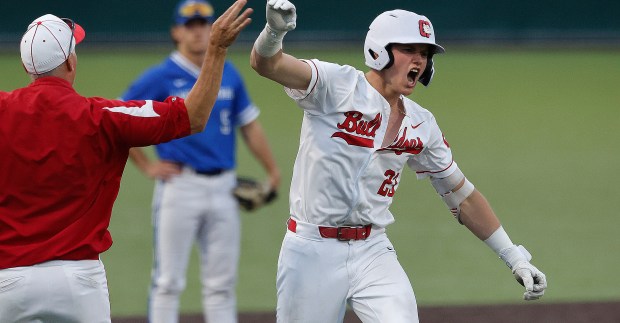Mayor Brandon Johnson delivered a pointed message to aldermen Tuesday evening about their “responsibility” to finalize his budget plans, while distancing himself from the political strife that dominated the recent budget cycle.
At an inaugural “Lakeside Chat” community engagement event to tout Johnson’s 2025 budget, the mayor and his budget director Annette Guzman sought to appeal directly to constituents after a bruising road to securing enough City Council votes for the $17.1 billion 2025 spending plan two weeks before the Dec. 31 deadline.
But the event at Harold Washington Library, originally billed for 300 guests, saw only a few dozen attendees.
Johnson’s focus on community engagement appeared to be a retort to the frustrated aldermen across the political spectrum who challenged his self-styled “collaborator-in-chief” moniker throughout the 2025 budget process. He repeatedly stressed to the room that it was the everyday Chicagoans “closest to the pain” that he prioritizes — while punting the onus of getting the budget across the finish line to the City Council.
The format of the event was a discussion between the mayor and Guzman, who asked him to speak on the “pretty democratic process” of putting together the 2025 budget.
“It is my responsibility to present a budget,” the mayor replied. “It is the City Council’s responsibility to pass that budget.”
“There are opportunities for us to sharpen our presentation … (and) we have more work to do to help strengthen those relationships on City Council so that that presentation doesn’t just get seeped into some political debate that is absent and void of this room,” Johnson said. “The debate was City Council versus mayor of Chicago. Where the debate really should be: City Council’s responsibility to pass a budget based upon the feedback that comes from this room.”
When aldermen in mid-December at last got Johnson’s 2025 spending plan over the finish line, the relief from City Hall was short-lived as questions swiftly abounded over how the next budget gaps could be plugged in the absence of structural fixes.
Raising property taxes — which Johnson flatly opposed during his mayoral campaign but was prepared to implement until the eleventh hour — will be just as politically fraught for the 2026 plan. Johnson’s attempted hikes during the recent budget cycle got winnowed down to $0 thanks to opposition not just from moderate opponents but also two of his staunchest progressive allies, Alds. Byron Sigcho-Lopez and Jessie Fuentes.
Then there’s major cuts, including layoffs, which the pro-labor mayor continues to reject. During Tuesday’s event, he responded to a question on finding efficiencies with: “Efficiencies and consolidation, those are triggering for me, to be perfectly frank.”
“Consolidations and efficiencies and cuts were used as rationale and justification to close 50 schools. So when I hear deficiencies, I hear it through the experience of individuals saying, ‘We need these efficiencies. It’s going to save us money.’ And it turns out, it doesn’t,” Johnson said.
Thus, the mayor continues to bang the drum on new, progressive revenue, most of which would hinge on either Springfield or voter buy-in. But Johnson’s relationship with Gov. JB Pritzker, who is battling a state deficit of his own, remains tenuous at best.
And two specific tax proposals Johnson has recently touted — Bring Chicago Home and the Fair Tax Amendment — were already rejected by voters at the ballot box in 2024 and 2020, respectively.
Johnson remained coy when pressed by reporters earlier Tuesday to explain if he was seriously pushing for another go at Bring Chicago Home, his failed referendum to raise the real estate transfer tax and use those funds for homelessness services. “Look, that’s not my decision alone,” he said. “All I’m simply saying is that because we take a hit, we don’t crumble.”
During the Tuesday panel, the mayor urged attendees to help him amp up the pressure on his progressive revenue agenda by saying “the quiet part out loud.”
“The state of Illinois needs the city of Chicago to be successful in order for the state of Illinois to be successful. So since we all know that to be the truth, then let’s not come out with our hand and hat in hand,” Johnson said. “If we claim to be the bastion of progressive politics, the ‘Blue Wall,’ the city and the state that stands up for working people, we can’t just quote that in a social media post.”
The Tribune’s Jake Sheridan contributed reporting.



